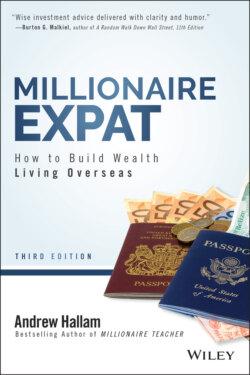Читать книгу Millionaire Expat - Andrew Hallam - Страница 33
Are Most Financial Advisors Bad People?
ОглавлениеWhen faced with evidence that conflicts with our beliefs, each of us should be able to change our mind. Several years ago, I thought financial advisors who built portfolios of actively managed funds fell under two categories: they were either naïve or evil (especially those selling offshore pensions to unwary expats). While some evil ones exist, most are just undertrained salespeople trying to make a buck from commissions and trailer fees. Their bias hurts investors, but it can hurt the advisors too. The most respected accreditation for financial advisors is a CFP (Certified Financial Planner or Chartered Financial Planner). Most financial advisors without this qualification are glorified salespeople with questionable training. But even the CFP training (which takes a fraction of the time to complete compared to a nurse, teacher, social worker or plumber's training) leaves most financial advisors woefully unqualified to build portfolios based on economic science.
Figure 3.1 Financial Advisors Can't Predict the Future
Illustration by Chad Crowe: Printed with permission.
I asked one of Canada's top financial planners, Benjamin Felix. He's a CFP with the firm, PWL Capital. “The CFP education program is designed to ensure that CFP professionals have a broad understanding of 12 topics core to the financial planning process,” said Felix. “Investments is one of those topics…but there is no requirement to fully understand the evidence in favor of buying and holding low‐cost index funds.”21 Edward Goodfellow, a CFP with PI Financial echoed the sentiment: “If advisors understood, from an academic perspective, how markets actually worked, they would be much more suited to provide advice. The problem is, markets are noisy and the advisors, investors and media get lost in the noise.”22 Olivia Summerhill, a Certified Financial Planner (CFP) with Summerhill Wealth Management, in Washington State says the same thing: “During the Certified Financial Planning extensive training, the focus is not on investment vehicles. A CFP candidate does not get any training in their program if actively or passively managed funds are better for clients.”23 That's why, if you have a financial advisor who built you a portfolio of actively managed funds, don't be too upset. After all, most advisors pee in their own drinking water.
Finance researchers Juhani T. Linnainmaa, Brian T. Melzer, and Alessandro Previtero gained access to portfolio performances for 4,688 Canadian financial advisors and about 500,000 the advisors' clients between 1999 and 2013. It was no surprise to see that most of the advisors bought actively managed funds for their clients. But they bought similar funds for their personal portfolios.
When comparing their performances to an equal‐risk adjusted portfolio of index funds or ETFs, the advisors underperformed by about 3 percent per year. Sure, the advisors paid fees that were higher than those charged by index funds or ETFs. But the advisors also chased past performance. They bought funds that were “doing well.” But they didn't read the SPIVA Persistence Scorecard. They didn't learn that funds that perform well during one time period usually lag the next.
That's why the advisors' personal money, and their clients' money, underperformed by 3 percent per year. Compounded over the 15‐year study, they unperformed similarly allocated portfolios of index funds by about 55 percent.
